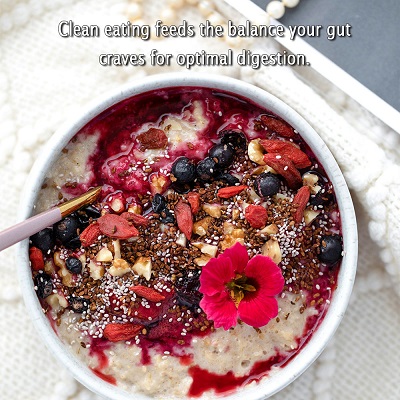 There has been a lot of talk lately on just how important our gut health is for long-term health. It affects absolutely everything in our body! If your gut health is in bad shape, your physical and mental health can suffer.
There has been a lot of talk lately on just how important our gut health is for long-term health. It affects absolutely everything in our body! If your gut health is in bad shape, your physical and mental health can suffer.
Do you have digestive discomfort? Whether it’s bloating, constipation, or indigestion, these issues often come from poor dietary choices, which are the foods that don’t support a healthy gut. Fortunately, clean eating can offer you relief by eating the foods that nourish and heal your digestive system.
Your Gut’s Role In Your Overall Health
Your gut does far more than digest the food you eat. As I said above, it affects everything. When your gut is out of balance, you will know by the symptoms. You may feel uncomfortable symptoms, such as gas, cramping, and irregular bowel movements, or other symptoms such as fatigue and skin problems.
The Common Culprits Behind Digestive Issues
If you have poor digestion, it often begins with eating overly processed foods. These foods have very little nutritional goodness. They lack fiber, are filled with artificial additives, and can disrupt the balance of your microbiome and especially affect the good bacteria in your gut.
Refined sugars, unhealthy fats, and excess alcohol are notorious for inflaming the digestive tract and leading to bloating and sluggish digestion. Plus, non-dietary factors compound the problem, such as stress, dehydration, and lack of movement and exercise.
Clean eating not only addresses the root dietary causes of gut issues but also promotes habits that improve digestion holistically.
Fiber is Necessary for Digestive Health
Fiber is essential for keeping your digestive system running smoothly, yet many people don’t get enough. Fiber is found in fruits, vegetables, whole grains, and legumes. It adds bulk to your stools, preventing constipation and promoting regular bowel movements.
There are two types of fiber, and both are vital for gut health. There’s soluble and insoluble. Soluble fiber, found in oats, apples, and carrots for example, helps to absorb water and forms a gel-like substance in the gut, aiding smooth digestion. Insoluble fiber, found in whole grains, nuts, and the skins of fruits, acts like a cleaner, sweeping through your digestive tract and keeping things moving along.
By incorporating a variety of fiber-rich foods into your clean eating plan, you’re setting your digestive system up for good health!
Probiotics and Your Gut Microbiome
Your gut is filled with bacteria and other micro-organisms, which are collectively known as the microbiome. When the balance of good and bad bacteria tips in the wrong direction, digestive issues can arise.
That’s where probiotics can help. Probiotics are live, beneficial bacteria found in foods like yogurt, kefir, sauerkraut, and kimchi. They are excellent foods for helping to restore balance in the microbiome.
Probiotic foods introduce friendly bacteria to your gut, supporting digestion and reducing inflammation. Prebiotic foods, like garlic, onions, and bananas, serve as fuel for these helpful microbes.
Together, probiotics and prebiotics work to strengthen your gut’s natural defenses and alleviate common digestive problems.
Foods that Heal and Support Digestive Health
Certain foods are particularly powerful in soothing and healing the digestive system.
Here are just a few:
- Ginger – Excellent for its anti-inflammatory and calming effects. It can also help to speed up digestion.
- Peppermint – This herb helps to relax the muscles of the digestive tract, and also helps to reduce gas and bloating.
- Bone Broth – This food is packed with collagen and gelatin, and can help to repair and strengthen the gut lining. It’s also helpful in alleviating symptoms of leaky gut.
- Papaya and Pineapple – These fruits contain natural enzymes that aid in breaking down proteins, which helps to ease digestion issues.
Don’t Forget the Healthy Fats
Healthy fats, often overlooked in discussions about digestion, are another key component of a clean eating plan. Fats from sources like avocados, olive oil, and nuts help your body absorb fat-soluble vitamins that are essential for digestive health.
They also provide lubrication for smoother digestion, reducing issues like constipation. Makes sense doesn’t it? Oils for lubricating? Omega-3 fatty acids, which are found in foods such as salmon, walnuts, and chia seeds, have anti-inflammatory properties that can soothe an irritated gut lining and improve overall digestive function.
Adding a moderate amount of these healthy fats to your meals can make a significant difference to your gut health!
Final Thoughts
By consistently following a clean eating plan, you will begin to relieve symptoms like bloating and constipation, and boost the health of your gut microbiome. This in turn will reduce your risk of chronic diseases linked to poor digestion.
Plus, these dietary changes can also have a positive impact on your brain health, as the gut is intricately linked to both!
Clean eating is a sustainable way to take care of your digestive system for life. Are you ready to eat your way to health? You can by making every meal a healthy one, which will make your gut and you happier!






